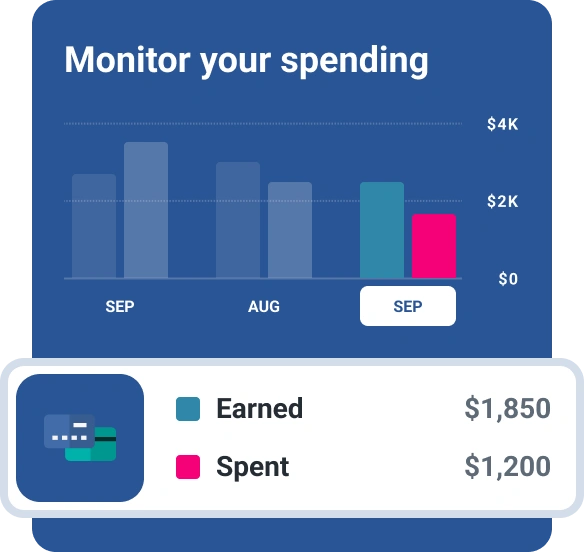What to Do if You’re Denied a Secured Credit Card
Quick Answer
If you’re denied a secured credit card, carefully review the adverse action letter you receive detailing why you were denied, then take steps to address potential credit and other issues before you apply again.

Secured credit cards are among the most accessible forms of credit you can get, but you can still be turned down if you don't meet all of the card issuer's requirements.
If you've recently been turned down for a secured credit card, follow these steps to understand why and to improve your approval odds the next time you apply.
Find Out Why You Were Denied for a Secured Credit Card
If you've been denied credit due to information found on your credit report, the lender is required by law to send you an adverse action letter. This letter will explain why you were denied and the rights you have as a consumer, such as the ability to get a free copy of your credit report, among other things.
Some of the common reasons for denial include:
- Inability to demonstrate an ability to repay debt: Lenders are required by law to assess your ability to repay any debt you incur on a credit card. If your income is insufficient to afford a monthly credit card bill, even having enough money for the deposit won't be enough to get approved.
- No verified income: If you claim income on your application, you may need to provide documentation for it. If you can't verify it, your application can be denied.
- Insufficient deposit: Although it can vary from one secured card to the next, the typical minimum deposit is usually $200 or $300. Some card issuers may require immediate funding, while others may give you a month or more to provide the deposit. If you don't meet that deadline, the card issuer won't open your account, and you'll need to wait until you have the required cash to apply again.
- Certain negative items on your credit report: Credit card issuers will typically deny your application if you're currently going through bankruptcy, for example. Some may even deny you if you've had a bankruptcy discharged recently. The same may go for other major negative items, such as collection accounts, repossession and foreclosure.
- Very low credit score: While secured credit cards are accessible for people with bad credit, card issuers may still have a minimum credit score requirement for approval. If you don't meet that requirement, you may need to spend some time building your credit score.
- Inaccurate information on your application: If you accidentally entered the wrong information on your application—for example, maybe there was a typo in your Social Security number, or you missed a zero when entering your income—the lender may deny it. Carefully review the information you provide before submitting any credit application.
How to Improve Your Credit Score Before Applying Again
If you get denied credit, you may be tempted to immediately apply for a different card. But keep in mind that a hard inquiry will be added to your credit report every time you apply for a credit card, which can result in a small decrease in your credit score.
While the effect of one hard inquiry is minor, each additional hard inquiry can compound the negative effect. To avoid hurting your score too much, take some time to improve your credit before you apply a second time. Here are some tips to help you get started:
- Pay bills on time. Your payment history is the most influential factor in determining your credit score. Make it a goal to get caught up on past-due credit accounts and pay your bills on time going forward.
- Reduce credit card balances. Your credit utilization rate—the percentage of your available credit you're using—is another important factor in your credit score. If you have other credit cards, try to pay down your balances. The lower your utilization rate, the better.
- Get credit for rent and other on-time payments. If you pay bills for rent, utility, phone, insurance and video streaming every month, you can get credit for those payments with Experian Boost®ø. This free feature connects your bank accounts, identifies eligible on-time payments and lets you choose whether to add them to your Experian credit file. You'll receive an updated FICO® ScoreΘ instantly and could see an immediate increase.
- Apply for new credit only if you need it. While hard inquiries typically don't have a significant impact on your credit score, it can still make it harder to get approved for credit in the future, especially if you have other negative items on your credit report.
Alternative Ways to Build Credit
Depending on your situation, it may make sense to pursue other ways to build credit, with or without a secured credit card. Here are some to consider:
Credit-Builder Loan
A credit-builder loan is a type of installment loan specifically designed to help you establish a positive payment history. Unlike other installment loans, which provide the loan proceeds upfront, credit-builder loan providers deposit the funds—usually $300 to $1,000—in a savings account.
Then, you'll make payments over a set repayment term—typically six to 24 months—which the lender should report to the credit bureaus: Experian, TransUnion and Equifax. When the term is over, you'll receive the loan funds to use as you wish. Make sure your lender reports your payment activity to all three credit bureaus.
Authorized User
If you have a parent or other loved one who manages their credit well, consider asking them to add you as an authorized user on their credit card account. Once you've been added, the account's payment history will be added to your credit reports.
Of course, this option only makes sense if the primary cardholder uses the account responsibly, paying on time and keeping their utilization rate low. Otherwise, it could damage your credit.
If you receive a card linked to the account, be sure to discuss expectations for paying for any charges you make.
Review Your Credit Reports
If you haven't already, take some time to review your credit reports to see if there are additional areas you can address. You can check your free Experian credit report anytime, and also get a free credit report weekly from Equifax and TransUnion through AnnualCreditReport.com.
While you review your credit files, watch out for anything you don't recognize. If you find inaccurate details, you have the right to file a dispute with the credit bureaus.
Monitor Your Credit to Track Progress
As you work on building your credit history, Experian's free credit monitoring service can help you keep track of your improvements with a FICO® Score powered by Experian data. You'll also get real-time alerts when new inquiries and accounts get added to your credit report.
As you work on building good credit habits and keep track of your improvements, you'll be on the right path to getting approved the next time you apply for a secured credit card.
Looking to build credit?
Discover secured credit card offers matched to you, so you can apply with confidence. Get started with your FICO® Score for free.
See your offersAbout the author
Ben Luthi has worked in financial planning, banking and auto finance, and writes about all aspects of money. His work has appeared in Time, Success, USA Today, Credit Karma, NerdWallet, Wirecutter and more.
Read more from Ben

